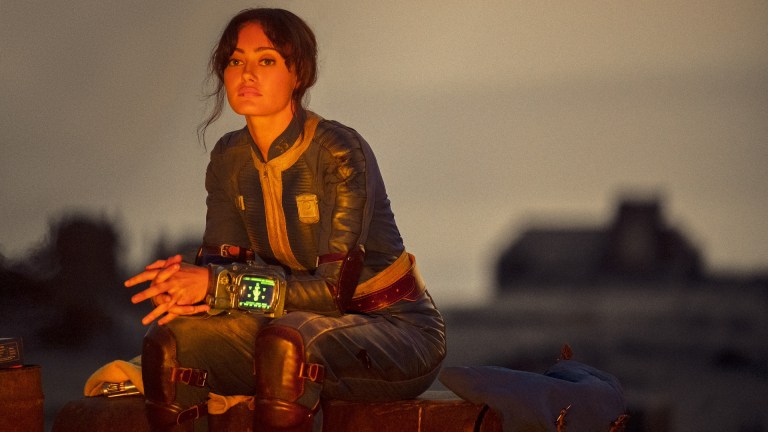Fallout Review: The Best Wasteland Story Yet
Prime Video's Fallout perfectly matches the vibes of the gaming franchise while introducing its own satisfying narrative.

This Fallout review contains no spoilers.
Prime Video’s TV adaptation of Fallout does something the games in the legendary franchise never have—put storytelling above all else. The show does lovingly recreate the nuclear Wasteland in a way that stays faithful to the series, but the story is all-new and unexpectedly thought-provoking. The TV characters are far more complex than their video game counterparts as well, though to be fair they do have the advantage of not having to stand unnaturally still while looking straight into the camera whenever they have something to say.
One of our main protagonists is Cooper Howard (the great Walton Goggins), a washed-up Western star who we meet in cowboy garb twirling his lasso at a kids’ birthday party in ‘50s Los Angeles to make ends meet. He’s taken his daughter to work, and suddenly to her horror, she sees a mushroom cloud in the distance in the LA skyline. And then, another. And another. In an effort to save humanity, survivors lock themselves in numbered underground fallout shelters called “Vaults” where they’ll remain protected from radiation for generations. Cue biiig time jump.
Like the games, the show is set in an alternate history United States more than two hundred years after Earth’s surface is torched and irradiated beyond recognition by nuclear war. We see the Wasteland through the eyes of three main protagonists: Lucy (Ella Purnell, Yellowjackets), a Vault-dweller heading up to the surface for the first time; Maximus (Aaron Moten, Emancipation), a hard-headed trainee of the militant Brotherhood of Steel; and The Ghoul, a merciless bounty hunter who is revealed to actually be our old friend Cooper. By periodically guzzling boatloads of drugs and chemicals, he’s managed to survive for centuries after the bombs first fell. The trade off is that he’s got a gaping hole where his nose used to be and an even bigger hole where his heart used to be.
Fans of the games will notice straight away that the show has absolutely nailed the look and sound of the world. The blue and yellow Vault-Tec suits, the ramshackle settlements, the hulking Power Armor suits. Even the glow-green Pip-Boy interface looks spot-on. And rose-colored ‘40s and ‘50s songs like franchise staples “I Don’t Want to Set the World On Fire” and “Maybe” drive home the show’s uncanny recreation of the games’ atmosphere, leaning into the irony and hilarity of setting gruesome acts of ultraviolence to saccharine love ballads.
But it’s the characters and the storytelling that really go above and beyond to make the show far more narratively compelling than the games. Lucy braves the savagery of the Wasteland to find her father Hank (Kyle MacLachlan) and comes to find that her pacifist, sheltered upbringing in the Vault does her little good amongst the liars and killers above ground. “Fuck the Vaults” one ornery settler spittles as Lucy opines about her people’s lofty long-term “reclamation” plans.
While Maximus has had a sheltered upbringing himself in many ways (all he’s known is life as an obedient Brotherhood of Steel grunt), he’s far less pure-hearted than Lucy. He’d do anything to step into the Power Armor the Brotherhood knights use to exert their dominance across the Wasteland. He’s power-hungry, bull-headed, and at times supremely idiotic, but still, there’s something likable about him.
The Ghoul is a far cry from the horse-riding hero we met in the opening moments of the show. He’s got a nasty mouth on him and an even nastier trigger finger. While at first he seems to be nothing more than a straightforward, no-BS bounty hunter at first, it’s gradually revealed throughout the season via flashbacks that, for him, there’s a lot more than money on the line. These backstory segments are some of the best in the show mostly thanks to Goggins, who with his performance somehow manages to capture the scope of a 200-plus year history within a single character.
Lucy and Max go through some serious internal changes over the course of the season that can’t be undone. They do regrettable things, they do some valiant things, and by the end of it…surprise! Turns out Fallout is a pretty damn good coming-of-age story. There are some real emotional stakes here, like the grim circumstances surrounding Max finally acquiring his Power Armor, and the alarming lengths to which Lucy is willing to fight for survival. There are some plot details that get in the way a bit (Max’s dynamic with the head of the Brotherhood is a complete head-scratcher), but overall, Lucy and Max’s journeys lead them to reveal their true selves to one another.
Aside from the show’s unexpectedly heartfelt story, there also happens to be copious amounts of blood and viscera flying around every episode, which seems only right considering how the games reveled in the post-apocalyptic violence via the iconic slow-mo V.A.T.S. cam. There’s an entertaining standoff in the second episode that sees The Ghoul in a violent shootout, and the inventive camerawork really makes every blood splatter sing. There are some jarringly intimate body horror moments as well, from severed limbs and digits to unsightly, radiation-inflicted deformities.
There are some disgusting displays of death and mutilation on display almost constantly throughout the show, but it’s wisely balanced out by a keen, albeit sick sense of humor. The Vault-dwellers’ painfully naive, “Okie-dokie!” attitude stands in stark contrast to the Wastelanders’ perpetual shit talking, and it’s fun laughing at Lucy’s abject cluelessness. At one point, she pushes the “Golden Rule”—do unto others, yadda yadda—on a desperately annoyed Ghoul, who claps back, “The Wasteland’s got its own Golden Rule: Thou shalt get sidetracked by bullshit every goddamn time.” Fans of the game will no doubt get a chuckle out of that one.
The show is solid from the jump, but like most great shows, the season has a sense of momentum to it. Episode 6 is a real turning point not just in the story, but in the complexion and tone of the way the show looks. Without getting into spoilers, the show takes on a twisted, Twilight Zone-inspired atmosphere that is genuinely disturbing.
The show’s mysteries and disparate pieces of lore begin to converge in a super compelling way that makes the last three episodes downright riveting and elegantly plotted, particularly for a show that seems somewhat campy on the surface. It’s also at this point later in the season that Purnell really starts to shine. There is some downright fucked up imagery shown in that sixth episode, and she uses her eyes to sell the terror of it all magnificently. She’s sensational in the back half of the season, as are Moten and Goggins.
While the three leads are excellent, Moises Arias threatens to steal the show as Lucy’s brother Norm, who stays behind at Vault 33 and slowly uncovers the troubling truth behind the origins of the shelter their family has called home from birth. Arias’ intensity lends gravity to every scene he’s in, and boy is that gravity needed come the finale when things get really bleak.
The cool thing about the show’s lore and world building is that it sort of mimics the experience of the game. Environmental storytelling is big here—a lot of significant plot points and even major emotional beats are delivered via set design, so when the characters start searching for clues, you can’t help but lean in close to scour every detail. “War never changes” is the central theme from the games, and the show explores the idea more deeply and meaningfully. The origins of the Vaults, the Brotherhood, the bombs—it’s all tied into the same harsh reality. The last couple of episodes delve into the evil machinations of war and those who wage it, but the material never gets too heady because we never lose sight of the main characters’ motivations and interpersonal drama.
It’s clear by the finale that the showrunners hope to extend Fallout into future seasons. There are a lot of loose ends to tie up, and the adventure seems to have just begun for the surviving characters (though some of their fates are seriously in question). Judging from this first batch of episodes, they’ve certainly earned a second season if they’re fortunate enough to get one. They’ve paid tribute to the games in spectacular fashion and crafted a new saga filled with fascinatingly demented characters whose biggest moments still seem yet to come.
All eight episodes of Fallout premiere Wednesday, April 10 at 9 p.m. ET on Prime Video.
